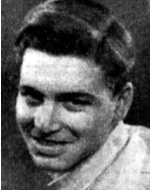Levengrat, Shimon
Son of-Yehudit-Arma and Stephan-Shimshon was born on September 21, 1927 in Tel Aviv. His parents returned with their baby son to Europe and spent the first six years living with them in various places, for some time in a rural environment that influenced his character. In 1933 the family returned to Israel and settled in Kiryat Bialik. Shimon would go to school every day in Haifa and then to the Tietz vocational school, where he specialized in framing. He was a member of the Scouts movement and was very active among the members of his group. His alertness and strong desire to know and to learn also influenced his friends, who gave him their trust and elected him to various positions. He was a member of the Haganah from his youth. In the last year of his professional studies, he was 17 and a half years old, enlisted together with his comrades in the British Army with the establishment of the Jewish Brigade. At the end of the war he returned from Holland to Palestine and began to work as a laborer in his father’s factory. He loved to study his books and continued his studies in the evenings. He was a strong man, handsome, bold and cheerful. It has always been the center of society, and yet its innocent simplicity has not been impaired. At the beginning of the War of Independence he went with members of the Haganah in the Carmiel Brigade of the Carmeli Brigade to train in various exercises. After a course in which he completed his studies at Bren and Pyat, he was sent to protect the besieged Yehiam. He participated in the battles for a-Zeib, Rosh Hanikra and the breakthrough to Yehiam. Moved with his company to the “Triangle”, participated in fierce battles over Jenin, where he proved his courage and was especially commanded by his commander. From there he returned to the Galilee. Participated in the occupation of Birweh, Rosh Hanikra, Zahva and A-Zib. On July 19, 1948, his department was called to participate in the conquest of Tarshiha. The attack was repulsed. Shimon and his comrades, as Fiat men, were ordered to retreat with the heavy instrument, which had no value in battle over an open field, and was required to attack elsewhere. When the order was executed, they were killed. According to his commander, Shimon excelled in the last battle with heroism, cold-heartedness and courage that was worthy of glory. Shimon was laid to rest in the military cemetery in Nahariya.
